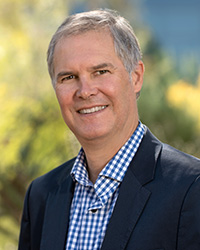A blow to the EPA’s ability to fight climate change
But Boyd Law professor Birdsong hopes Congress’ passage of the Inflation Reduction Act mitigates decision

By Pat McDonnell
In the decades-long battle to control how industrial air, water, and land pollution is regulated, the U.S. Supreme Court has clipped the wings of federal agencies such as the Environmental Protection Agency, William S. Boyd School of Law at UNLV professor Bret Birdsong believes.
In June, SCOTUS ruled in West Virginia v. Environmental Protection Agency that the EPA could not broadly regulate greenhouse-gas emissions from coal- and natural-gas-fired power plants without specific congressional authority to address climate change. In a 6-3 opinion, the conservative majority said the agency had assumed too much authority in trying to enact a transformative market shift to renewable energy sources in its bid to contain climate change.
“What they’re doing is taking interpretive authority away from [federal] agencies and reserving it to themselves as Supreme Court justices while requiring Congress to speak clearly about so-called major questions,” Birdsong said.
With control of both the executive and legislative branches of government, however, the Democratic administration may have mitigated the effects of the judicial decision by passing important climate legislation.
President Joe Biden signed the Inflation Reduction Act in August, unleashing about $370 billion in climate and clean energy funding. Birdsong says the legislation lessened the impact of the Supreme Court’s ruling for climate action.
“Since Congress has acted, that somewhat mitigates the concern about whether [the ruling] cripples our climate strategy,” he notes. “We still have a climate strategy; it might be effective, but the crisis requires an all-tools, all-hands-on-deck approach.”
Birdsong, a Boyd Law professor since 2000 and co-author of a leading casebook on natural resources law, himself remembers how West Virginia’s beautifully rugged, yet sometimes dangerous landscape affected a canoe camping trip he once took on the Cacapon and upper Potomac Rivers.
“On one memorable occasion when I was about 10, the river suddenly rose one afternoon, and I was pulled by a neighbor from a rapid after my canoe totally swamped,” he says.
Water, and the West’s lack of it, is something Birdsong is watching closely. He has provided legal advice on conservation to the Secretary of the Interior as deputy solicitor for land resources in the Obama administration. Birdsong emphasizes that law students benefit particularly from knowing water law.
“To me, it is the most acute example of the natural world intersecting with the urban world,” he says.
As Birdsong looks ahead to the next 15 to 20 years and considers how the country will tackle the twin crises of climate change and biodiversity loss, he says law students should help society balance industrial growth while it maintains healthy natural resources.